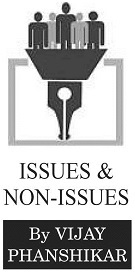Dark Valley Of Learning-2
| Date :11-Jan-2020 |

Bengaluru: As he inaugurated five Young Scientists’ Laboratories of the Defence Research and Development Organisation (DRDO) last week, Prime Minister Narendra Modi urged the scientists not to get encumbered by the fact that the new entities were restricted to young scientists only up to the age of 35 years. “Build more labs like these and accommodate even those who cross that upper age limit, but do not impede the flow of research,” he said in effect. ... (Agencies)
FINE words, these, by any standard. There is little doubt that such an assurance of full freedom of right action coming from the Prime Minister has immense value in the wider scheme of things in the country. “I am with you”, Mr. Modi said in the most assertive assurance one can hear from a person of his eminence.
There is a need to ensure that this feeling percolates to the lower-most layer of India’s learning pyramid in the fastest and best possible manner. For, if there is bright sunshine at the top, there is a dark valley in the lower layers where learning the right thing in the right manner is a matter of a scary scarcity. Learning of sciences in average Indian schools is a matter of dark concern for all. For, what is available in reality is nothing but an overall neglect of studies of sciences in theory and in laboratories. In most schools -- of whatever material richness -- studies of the sciences is only perfunctory in practice.
If most school labs are only nominal, to say the least, the libraries are worse, further limiting the scope of studying of the sciences by the students. In vast numbers of cases, school managements, too, are concerned only about pushing the students to scoring higher marks somehow. In that pursuit, many malpractices, too, are undertaken with the sole purpose of pushing the kids to some “good” career-line that suits for schools’ promotion in admission market.
If this is the general situation, the country is restricting a benevolent spread of study of sciences at the school and later at the college levels. There is no doubt that despite this terrible lacuna, the country is producing good numbers of capable young scientists that are acting as promises of future. But the country will benefit more if studies of sciences are promoted at school and college levels with meticulous care and solicitous deployment of resources, financial and intellectual.
If this is done with much care, then the Prime Minister’s words will carry a greater weight in gold.
Unfortunately, this has not been happening not just for now but for the past seven decades since Independence. Every year, customarily, the Prime Minister talks of promoting sciences, spreading scientific temper, and motivating innovation. We must accept that these statements carry a lot of importance in reality. However, their effect would have been greater if there were an appropriate, well-oiled system of studies of the sciences complete with decent laboratories and libraries to support the kids. Unfortunately, it is in this area that the country has to tread in darkness.
True, there are many, many good schools with a lot of resources and can boast of good laboratories and libraries. Yet, the cumulative good effect of their resources gets limited terribly because of, one, absence of right perspective on studies of sciences; and two, the wrong focus on rote learning at the cost of development of subjective understanding of sciences, an area where deep and analytical young minds are developed.
In nutshell, the stress on high marks at the cost of learning is the killer factor of sciences in average Indian schools. And this is one area that has never been paid much attention to in the past seventy years. As a result, the national pool of scientifically-oriented young minds is small and almost flat, lacking the necessary depth.
It is necessary to appreciate the spirit in which Mr. Narendra Modi has tried to promote sciences. Yet, it is the national need of the day that he pay full attention to correcting the many wrongs that inflict the lower layers of the pyramid of studies of the sciences in average Indian schools. The moment Mr. Modi starts doing that, improvement would follow in a natural course.
What the country needs today is an excellent school system in which the stress is more on genuine, subjective learning where thinking is encouraged and not on rote system in which mere mugging up of the curriculum is considered good enough.
Factually, that is not good enough at all. For, in the long run, the nation emerges the loser with a small national pool of young scientists with best brains. The need is to introduce in schools and colleges certain scheme riding on the shoulders of appropriate philosophy so that every school student in the country gets a chance to try his or her hand at sciences.
This is not a utopian expectation. In fact, this is the most basic idea that needs to be nursed to its full bloom. May there be a nationwide effort to spruce up school laboratories and libraries that would act as grooming grounds for promising scientists. There often is a political tall talk in this regard, but nothing actually sprouts in the field. This is not the condition which the nation had ever bargained for.
It is time, therefore, that Prime Minister Mr. Narendra Modi started checking the reality in the lower layers of the country’s educational pyramid so as to get the fullest idea of what needs to be done to change the situation. His personal interest would act as a real booster dose in an appropriate domain that has been crying for national attention for decades.
The country does need five Young Scientists Labs all right, but it also needs thousands of basic labs in average schools across the landscape.